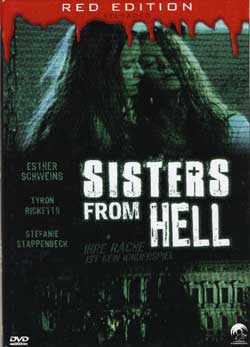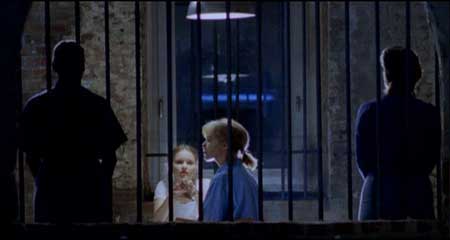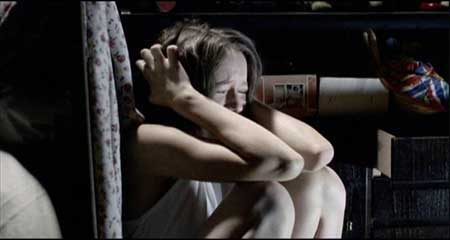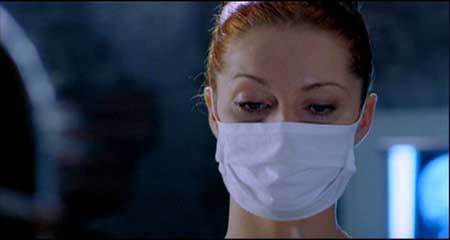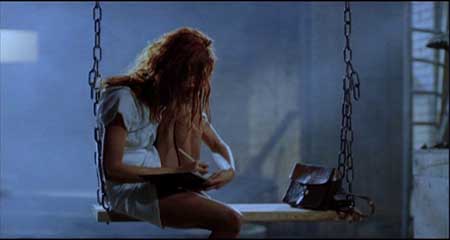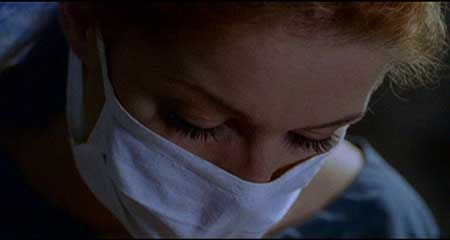SYNOPSIS:
A secret society operating in the private pediatric clinic for years its disgusting Sexrituale. Now the cold walls of the clinic are seemingly abandoned, but two severely traumatized sisters live there and yearn for revenge. After they find the boat and members of the federal and drive their own game with them. Only the roses in the courtyard reminiscent of the corpses. A Young cop comes to them on the ropes and tries to stop the murderous goings, but “who is going into danger.
REVIEW:
Rosenkavalier (also known as Sisters From Hell, which while somewhat fitting seems a generic alternate title) is a German crime/mystery movie from 1997 directed and co-written by Leon Boden. There are a lot of good aspects of the film: an interesting idea, a dark mood, some good acting by the two main leads. But a few good pieces do not necessarily make a great whole, and this movie is a pretty strong example of that.
Our story follows sisters Maxi (Stefanie Stappenbeck) and Saskia (Esther Schweins) as they work through some issues from their childhood. Saskia writes in a diary. Maxi sings in a band at a rowdy goth/punk/rave club called X-Rated (a very Lost Boys setting, minus the long haired, muscle-bound saxophone player). It turns out their parents ran a children’s medical practice, but formed the Knights of the Eternal Rose on the side, a group of eight doctors that did very bad things to some of their patients. Their mother and father took the fall for those crimes, their mother being sent to prison, their father being shot and killed trying to escape the arresting officers. The sisters were witnesses to some of these crimes, and they are still angry. So they write a Kill Bill-like list and set out to murder each and every one of their parents’ living associates. Meanwhile, Spike (Tyron Ricketts) is a second generation detective who is assigned the task of investigating the disappearances of the doctors. He also happens to be a big fan of Maxi’s band, spending a lot of his free time trying to woo her.
The unfortunate thing is that this is pretty much as far as the movie goes. We have an interesting set up, a motivation for the sisters to exact revenge, and they do, but the action doesn’t really pick up. The director opted to not go the ultra-gore route, having the sisters instead calmly and methodically slit their victims’ throats. Maybe this is one of those movies that needed the spark of gratuitous gore to get it going, because with the exception of the creepy, featureless mask they put on each victim, without the extra red stuff the murders all seem very blah.
The girls go on to bury each victim in the yard under a white rose plant, then send photos of the graves, along with the doctor’s initials written on them, to their mother in prison. This is an interesting touch, but the story doesn’t do anything more with it. There’s not any close calls, or people stopping by the house, or anything to build any kind of suspense (for an example of this done right, check out Cadavres). And even knowing that the detective is that close to the killer, we still don’t feel any electricity when they interact, it just feels like two unrelated characters sharing a scene.
There has to be something good about this movie, right? And there is, a few things in fact. It is shot well, the scenes effectively building a mood that the story simply fails to capitalize on. Like I said before, I do like the general idea of the revenge story, it is not wholly original but certainly not a complete copy of some other film (that I’ve seen anyway). I think the best part of the movie is the acting by Stappenbeck and Schweins in their respective roles as the sisters. They have good on screen chemistry, and quite a few scene show them communicating well without words but more through their eyes. It simply seems that their characters were not written with much depth, and so they did their best with what they were given.
Rosenkavalier is a film that might appeal to fans of 1990’s crime and mystery films. It looks good, and it is well acted, but the story unfortunately falls a bit flat. It somewhat telegraphs its finale, and it leaves some loose ends that, while not seeming pertinent to the story, may then leave you asking why they were included in the first place (for example, there is talk of Spike’s father having been a detective, and there’s a couple of scenes that relate to this, but it all ends up more filler than backstory that explains his actions). The best way I can think to sum up my feelings of this movie is to say that I wouldn’t go out of my way to see this film again, but if it was on TV, I wouldn’t hurry to change the channel.
 Horror News | HNN Official Site | Horror Movies,Trailers, Reviews
Horror News | HNN Official Site | Horror Movies,Trailers, Reviews
